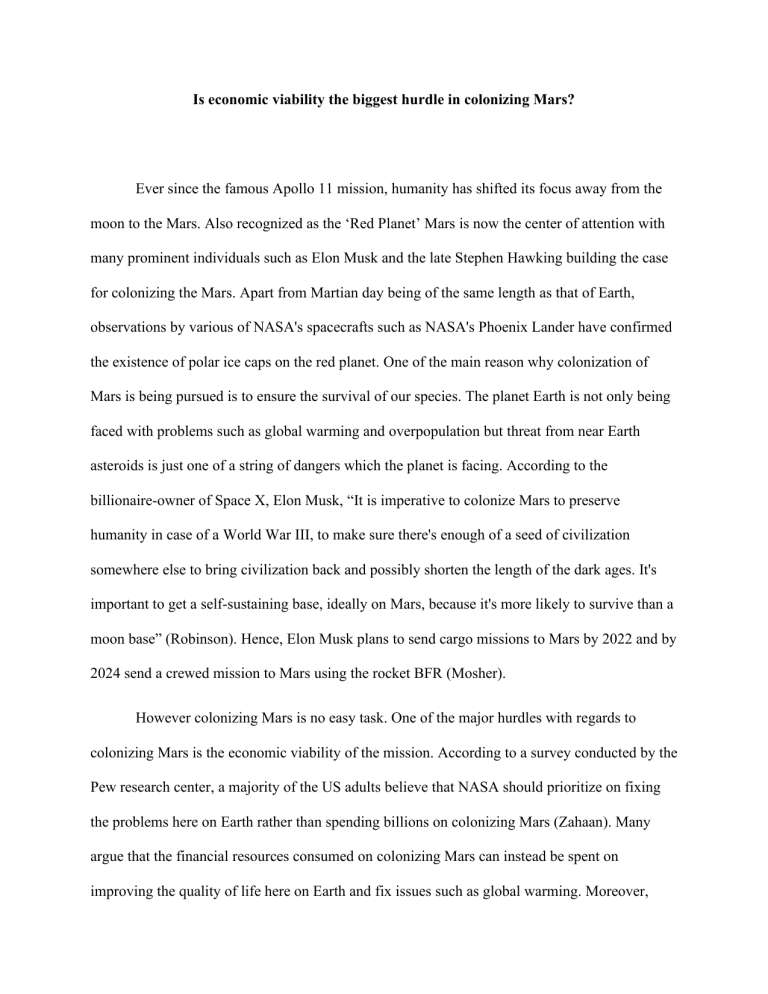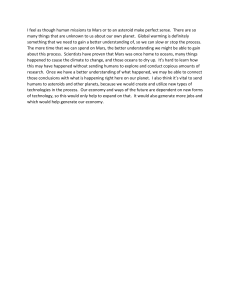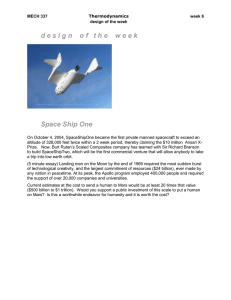Is economic viability the biggest hurdle in colonizing Mars. Research article 5-converted
advertisement

Is economic viability the biggest hurdle in colonizing Mars? Ever since the famous Apollo 11 mission, humanity has shifted its focus away from the moon to the Mars. Also recognized as the ‘Red Planet’ Mars is now the center of attention with many prominent individuals such as Elon Musk and the late Stephen Hawking building the case for colonizing the Mars. Apart from Martian day being of the same length as that of Earth, observations by various of NASA's spacecrafts such as NASA's Phoenix Lander have confirmed the existence of polar ice caps on the red planet. One of the main reason why colonization of Mars is being pursued is to ensure the survival of our species. The planet Earth is not only being faced with problems such as global warming and overpopulation but threat from near Earth asteroids is just one of a string of dangers which the planet is facing. According to the billionaire-owner of Space X, Elon Musk, “It is imperative to colonize Mars to preserve humanity in case of a World War III, to make sure there's enough of a seed of civilization somewhere else to bring civilization back and possibly shorten the length of the dark ages. It's important to get a self-sustaining base, ideally on Mars, because it's more likely to survive than a moon base” (Robinson). Hence, Elon Musk plans to send cargo missions to Mars by 2022 and by 2024 send a crewed mission to Mars using the rocket BFR (Mosher). However colonizing Mars is no easy task. One of the major hurdles with regards to colonizing Mars is the economic viability of the mission. According to a survey conducted by the Pew research center, a majority of the US adults believe that NASA should prioritize on fixing the problems here on Earth rather than spending billions on colonizing Mars (Zahaan). Many argue that the financial resources consumed on colonizing Mars can instead be spent on improving the quality of life here on Earth and fix issues such as global warming. Moreover, spending money on renewable forms of energy and strengthening our planets defense system against asteroid collisions would be more sensible. Furthermore, NASA's William H. Gerstenmaier publicly admitted in 2017 that NASA currently doesn’t possess the funds to send human missions on Mars (Berger). However, I firmly believe that economic viability is not the biggest obstacle in colonizing Mars, instead there are bigger hurdles such as the Martian atmosphere, the radiations on Mars and the psychological effects of the Martian lifestyle. The reason why I believe these are bigger hurdles is essentially if we plan to colonize Mars, it’s not too much to ask that humans should at least be able to breathe freely. For how long will we be dependent on technology for us to be able to live there? There will inevitably come a time when technology will fail us. Moreover, the Martian dust storms will not help solve this problem. The Martian dust is much finer than the dust at earth, not to mention that it is electrostatically charged, this will clog the electronic devices we will bring to Mars. The Martian atmosphere is one of the major hurdles which we need to look at when considering the possibility of colonizing Mars. Numerous lines of geophysical and geochemical evidence suggest that Mars once had a much denser atmosphere than at present. It was capable of supporting liquid water long enough to develop flow channels, streambeds, sediment deposits, and evaporite deposits. The modern atmosphere of Mars is less than 1% terrestrial atmospheric pressure, composed of 95.7% Carbon Dioxide, 2.0% Nitrogen and 0.2% Oxygen by volume (Livengood). Moreover, as Mars is further away from the sun and has a thin atmosphere, it has a much colder atmosphere than that of the Earth. The mean temperature on Mars is around -60 degrees Celsius. During winters, temperature at the poles can get as low as -125 degrees Celsius. During summers the temperature can go up to 20 degrees Celsius near the equator, but at night the temperature can drop to around -73 Celsius (Sharp). Furthermore, Mars is infamous for its dust storms which sometimes can even be seen through telescopes on Earth which show how devastating they can be. One begs to ask the question that what would be the impacts of these harsh conditions and how they will be a problem for people who colonize Mars. The low level of Oxygen in the Martian atmosphere means that artificial Martian habitats would need to be built with complex life support systems and pressurized which will require a lot of energy. A useful source of energy to be utilized would be solar power however the Martian dust particles are tiny and electrically charged, hence they stick to the surfaces they touch. Even dust devils, which are less devastating than usual storms, can move enough dust to cause the equipment to be completely covered and reduce the intensity of rays hitting the solar panels, which would result in less power being generated. The prospect of dust settling on and in machinery is a challenge for engineers designing equipment for Mars (Mersmann). However, many people argue that it may be possible to terraform Mars. Terraforming is process of altering a planet’s atmosphere to make it more Earth-like. However, according to a press release by NASA, they stated that it would be impossible to terraform Mars with the technology we possess (Steigerwald). Bruce Jakosky, of the University of Colorado, stated “Our results suggest that there is not enough CO2 remaining on Mars to provide significant greenhouse warming were the gas to be put into the atmosphere; in addition, most of the CO2 gas is not accessible and could not be readily mobilized. As a result, terraforming Mars is not possible using present-day technology” (Steigerwald). The life on earth is shielded from the space radiation by the powerful magnetic field and the thick atmosphere. Space radiation is made up of three different kinds of radiations: Glactic cosmic rays, particles blasted into space during solar flares and particles entrapped in the Earth’s magnetic field. These space radiations are classified as ionizing radiations (Why space radiation matters) Ionizing radiations can be very harmful as they can go through substances and alter them as they pass through (Reeves). Since the atmosphere of Mars is very thin and it has no magnetosphere, most of the dangerous space radiation reaches its surface. NASA's 2001 Mars Odyssey spacecraft, in the span of a year and a half distinguished the radiation levels which were 2.5 times higher than what space travelers experience on the International Space Station, 22 millirads every day. The spacecraft also recorded events that got the radiation level up to around 100 millirads (Williams). In developed countries, humans are exposed to about 0.62 rads per year. According to various studies, a human body can endure up to 200 rads without permanent damage, continued exposure to the sorts of levels detected on Mars could prompt numerous medical issues (Williams). While it may still be possible for human to protect themselves from the space radiations by building underground habitats, as soon as the humans leave the habitats they will be exposed to the ruthless radiation. The risks of the radiation may be quantifiable over a few years but not over a lifetime. The high radiation dose would have major health effects on the people on Mars. One of the major risks of radiation on Mars would be radiation induced cancer caused due to exposure to ionizing radiations while travelling to Mars and while living there as well. However, there is no data available for humans and limited radiobiology data available for assessing the effects of the high-energy ions present in the galactic cosmic rays. Moreover, radiation would also cause cataracts and cardiovascular diseases. A new study shows that Mice exposed for half a year to the radiation levels normal in interplanetary space demonstrated genuine memory and learning inadequacies. Thus, almost certainly a similar impact might be felt by the astronauts heading out to Mars (Wall). For long-term habitation on Mars, possible in utero exposures should be taken into account. Radiation exposure in utero can have major health effects at significantly lower doses than in adults. The threshold for developmental abnormalities in the fetus during major organogenesis appears to be about 0.1 Sv acute gamma rays. Protecting the fetus on Mars should be possible using available regolith for shielding material, but it would be difficult to achieve the shielding required to protect the fetus during transit. A critical health effect for human colonization of Mars might be the infertility in women resulting from radiation exposure in utero (Straume). The life on Mars would be quite different from that on Earth. The first humans to go to Mars would have to study the environment and the effects Martian life would have on the human body and mental health. These first individuals would be subjected to surveillance and monitoring from earth which could have dire consequences on their mental and physical health. It is known that constant surveillance leads to increased levels of stress, fatigue and anxiety. 1 Moreover, it can exacerbate the psychological consequences of physical confinement and isolation, which can cause problems like depression, stress, fatigue and abrasiveness. In an article by The Guardian titled “Mars One: The psychology of isolation, confinement and 24-hour Big Brother”, 2Chris Chambers explores the situation where the colonists may be forced to briefly or permanently sever the surveillance channels due to the psychological effect of seclusion and the absence of privacy. There isn’t much research available about the extent of psychological effect Mars colonists would face. However, understanding this would be essential 1 https://www.theguardian.com/science/head-quarters/2013/aug/26/nsa-gchq-psychology-government-masssurveillance 2 https://www.theguardian.com/science/head-quarters/2013/sep/09/neuroscience-psychology to select the prospective participants. Key traits such as adaptability, creativity, resilience and the ability to trust others were some of the traits needed for the application of the Mars one program. However, it is still not clear how these traits would be evaluated and measured. Furthermore, it is not apparent whether these traits are deemed crucial for reducing the prospect of a person developing a mental illness because of lengthy social isolation or whether they are predictors of better emotional stability. There is little doubt that the individuals selected for the mission will develop mental illness, since even the most experienced space crew members develop symptoms of anxiety and depression after a lengthy spell in space. This is despite the years of training they receive on earth and being not as far away from Earth than the Mars colonists would be Nick Kanas, who is an Investigator on several international psychological research projects and an expert in psychology of space exploration, states in his book “Humans in Space” that upon leaving Earth on their expedition to Mars, the crew are likely to feel extreme homesickness, loneliness and boredom which can lead to anything from psychosis to dysphoria and suicidal thinking. Moreover, when they reach the surface of Mars, the colonists will switch their small spacecraft for an equally restricted base environment where they would have to spend majority of their time. This is because Martian atmosphere is unbreathable for a human, with around 96% carbon dioxide and less the 1% Oxygen, as opposed to 21% Oxygen on Earth. Moreover, the habitats would have to be built underground with no windows in order to protect the colonists from radiation. There is evidence that the pleasure of natural outdoor environment and various sensory experiences improve mental health and reduce stress. 3 Hence, without being 3 https://www.takingcharge.csh.umn.edu/how-does-nature-impact-our-wellbeing able to experience this outdoor environment the colonists would need to find a way to combat stress and depression. Looking at the other perspective that the economic viability is the biggest hurdle in colonizing Mars. There exists an incredible economic barrier in colonizing Mars which is difficult to cross. Making humans a multi planetary species is a prospect which excites most of the people, however there is a lot of resistance, which is difficult to counter. First, we will look at the astronomical transportation and development costs of colonizing Mars. According to Elon Musk, with the technology we currently possess, as of right now the ticket price of going to Mars is about 10 billion dollars per person. Calculation regarding the feasibility of colonizing Mars is a difficult task, but Sydney Do, a researcher at MIT, has tried to do so. He lately co-authored a detailed review of Mars One, which plans to set up a Mars colony by 2024. Most due to the ballooning costs involved in sustaining a human presence on Mars, Do found the plan in its current form “fundamentally unfeasible,” he explains. “It is expensive in terms of the need to supply them with spare parts, keep systems running that extract water and create gases for them to breathe,” he added.4 Moreover, a lot of our economic resources would be used up to develop the technology to enable us to send colonists to Mars. The rocket BFR which Elon Musk aims to develop for Martian missions is still under development, so we are still unaware of the complications it may face until it is fully developed. Furthermore, Elon Musk’s starship aims to send around 100 people to Mars at once, however, the most we have ever managed is eight. Plus, the spacecraft Musk hopes to build is very heavy. Sydney Do points out that it has almost similar mass as that of the 4 https://www.bbc.com/future/article/20160928-the-astronomical-cost-of-going-to-mars-and-staying-there International Space Station.5 Additionally, for Mars colonization to become a real prospect there should be a solid plan to terraform it, which is impossible with the current technology. Hence, we would have to consume our economic resources to develop the technology needed to colonize Mars. A lot of people argue that rather than spending enormous amount of money to make Mars habitable, we should use the money to improve the life on Earth. Dr Andrew Glikson, an Earth and paleo-climate scientist, believes that space colonization ideas are mostly promoted by entrepreneurs and engineers for their own economic gain. Meanwhile, rarely any biologists and medical scientists endorse this idea as they understand the terrestrial origin and physiological limitations of the human body. Additionally, he further adds “As a scientist who examines how a changing climate influences human evolution, I argue that funds on this scale would be better directed at the defence of the lives of more than 7 billion humans on Earth, as well as protection of animals and of nature more broadly.” Another author, Zahaan Bharma, who is a recipient of Nasa's Exceptional Public Achievement Medal, holds similar views as that of Dr Glikson. He states that “If we have not figured out how to deal with problems of our own making here on Earth, there is no guarantee that the same fate would not befall Mars colonists”.6 In refutation of the first argument that the cost per person is not feasible. Elon Musk says that the cost is very dependent on the volume of travelers to Mars. He adds that he is confident that one day the costs of the ticket to Mars can be driven to less than 500,000 dollars or possibly even less than 100,000 dollars, low enough that people in America could just sell their house and shift to Mars. 5 6 https://www.bbc.com/future/article/20160928-the-astronomical-cost-of-going-to-mars-and-staying-there https://www.theguardian.com/science/blog/2018/aug/28/the-case-against-mars-colonisation In refuting the second argument that a lot of our economic resources would be consumed to develop the technology need for colonizing Mars. I am of the belief that though it may be expensive at first but as we progress to a more developed world, the prices of the technology will go down. The prospect of colonizing Mars will also promote technological advancement. Moreover, we need to look at the economic benefits we’ll get from colonizing Mars. Robert Zubrin in his research paper states “Mars may have concentrated mineral ores, with much greater concentrations of ores of precious metals readily available than is currently the case on Earth due to the fact that the terrestrial ores have been heavily scavenged by humans for the past 5000 years. It has been shown that if concentrated supplies of metals of equal or greater value than silver were available on Mars, they could potentially be transported back to Earth at high profit by using reusable Mars-surface based single stage to orbit vehicles to deliver the cargoes to Mars orbit, and then transporting them back to Earth. The existence of such Martians precious metal ores, however, is still hypothetical.”7 To counter the third argument that we should use the finances instead to improve the life on earth. Stephen Hawking, one of the most famous scientists of our generation, believed that with the growing lists of threats such as climate change and overpopulation, hawking believed that we have reached a point of no return. Hence, we should consume our resources on colonizing mars, to make sure there is human life beyond earth. To conclude, I believe hurdles such as the Martian atmosphere, Martian radiation and the psychological effects of life on Mars, need more attention than the economic viability. This is because we need to make sure that humans would at least be able to breath and live on Mars 7 http://www.marspapers.org/paper/Zubrin_1995.pdf before considering whether is it economically viable. The low level of oxygen in the Martian atmosphere would make it impossible for humans to breathe without oxygen tanks. The thin atmosphere of Mars would result in dangerous cosmic radiation to reach the Martian surface; hence we need to find ways to effectively combat the radiation by terraforming the atmosphere. Finally, the colonists would have to continually be psychological assessed to make sure that they do not fall under the symptoms of depression. The opposition argues that due to the high economic costs and better use of the financial resources on earth, economic viability is the biggest hurdle. However, as we progress to a more developed world the technological costs will go down and we should look into expanding our species to make sure there is life beyond earth to make sure incase of a disaster, there are humans present elsewhere. Bibliography Robinson, Melia. “Elon Musk wants to colonize mars with spaceX – Here’s what he said it will be like as one of the residents.” Business Insider. 11 Mar. 18. Web 15 Dec. 2019 https://www.businessinsider.com/elon-musk-colonization-of-mars-sxsw-2018-3>. Mosher, Dave. “Elon Musk says spaceX is on track to launch people to Mars within 6 yearsHere is the full timeline of his plans to populate the red planet.” Business Insider. 2 Nov 2018 Web 15 Dec 2019 https://www.businessinsider.com/elon-musk-spacex-mars-plantimeline-2018-10 Bharmal, Zahaan. “The case against mars colonization” The Gaurdian. Gaurdian News and media, 28 Aug. 2018 Web 15 Dec 2019 <https://www.theguardian.com/science/blog/2018/aug/28/the-case-against-marscolonisation>. Berger, Eric, "NASA finally admits it doesn't have the funding to land humans on Mars." Ars Technica. 13 July 2017. Web 15 Dec. 2019 <https://arstechnica.com/science/2017/07/nasafinally-admits-it-doesnt-have-the-funding-to-land-humans-on-mars/>. Livengood, Timothy A. "Evidence for diurnally varying enrichment of heavy oxygen in mars atmosphere." Icarus. Academic Press, 01 Aug. 2019 Web 15 Dec. 2019 <https://www.sciencedirect.com/science/article/pii/S0019103518307097?dgcid=author>. Sharp, Tim. "What is the temperature of mars?" Space.com. Space 30 Nov 2017 Web 15 Dec 2019 https://www.space.com/16907-what-is-the-temperature-of-mars.html Hille, Karl. "The fact and fiction of martian dust storms." NASA. NASA, 18 Sept 2015 Web 15 Dec. 2019 https://www.nasa.gov/feature/goddard/the-fact-and-fiction-of-martian-duststorms/ Steigerwald, Bill "Mars terraforming not possible using present-day technology." NASA. NASA, 25th July 2018 Web 15 Dec. 2019 https://www.nasa.gov/pressrelease/goddard/2018/mars-terraforming Perez, Jason. "Why space radiation matters." NASA. NASA, 13th April 2017 Web 15 Dec. 2019 https://www.nasa.gov/analogs/nsrl/why-space-radiation-matters Reeves, Katherine K. “Space Radiation” NASA 27th April 2017 Web 15 Dec. 2019 https://www.nasa.gov/sites/default/files/atoms/files/space_radiation_ebook.pdf Williams, Matt. "How bad is the radiation on mars?" Phys.org Phys.org, 21st Nov 2016 Web 15 Dec. 2019. https://phys.org/news/2016-11-bad-mars.html Wall, Mike. "Space radiation will damage mars astronauts' brains." Space.com. Space, 8th August 2019. Web 15 Dec 2019. https://www.space.com/space-radiation-damage-mars-astronautsbrains.html Straume, Tore. "Radiation hazards and the colonization of mars: brain, body, pregnancy, InUtero development, cardio, cancer, degeneration." Journal of Cosmology. 5th November 2010 Web. 15 Dec. 2019. http://journalofcosmology.com/Mars124.html Chambers, Chris. “The flawed psychology of government mass surveillance" The Guardian. Guardian News and media, 26th August 2013 Web 15 Dec. 2019 https://www.theguardian.com/science/head-quarters/2013/aug/26/nsa-gchq-psychologygovernment-mass-surveillance Chambers, Chris "Mars One: The psychology of isolation, confinement and 24-hour big brother" The Guardian. Guardian News and media 9th September 2013. Web. 15 Dec 2019 <https://www.theguardian.com/science/head-quarters/2013/sep/09/neurosciencepsychology>. Larson, Jean. "How does nature impact our wellbeing?" Taking Charge of Your Health & Wellbeing. Web 15th December 2019. <https://www.takingcharge.csh.umn.edu/how-doesnature-impact-our-wellbeing>. Baraniuk, Chris. "The astronomical cost of going to mars - and staying there." BBC Future. BBC, 28th September 2016 Web 15 Dec. 2019 https://www.bbc.com/future/article/20160928-the-astronomical-cost-of-going-to-mars-andstaying-there Bharmal, Zahaan. "The case against mars colonisation." The Guardian. Guardian news and media, 28th August 2018 Web 15 December 2019 https://www.theguardian.com/science/blog/2018/aug/28/the-case-against-marscolonisation Zubrin, Robert. “The economic viability of mars colonization” 1995 Web 15 December 2019 http://www.marspapers.org/paper/Zubrin_1995.pdf




